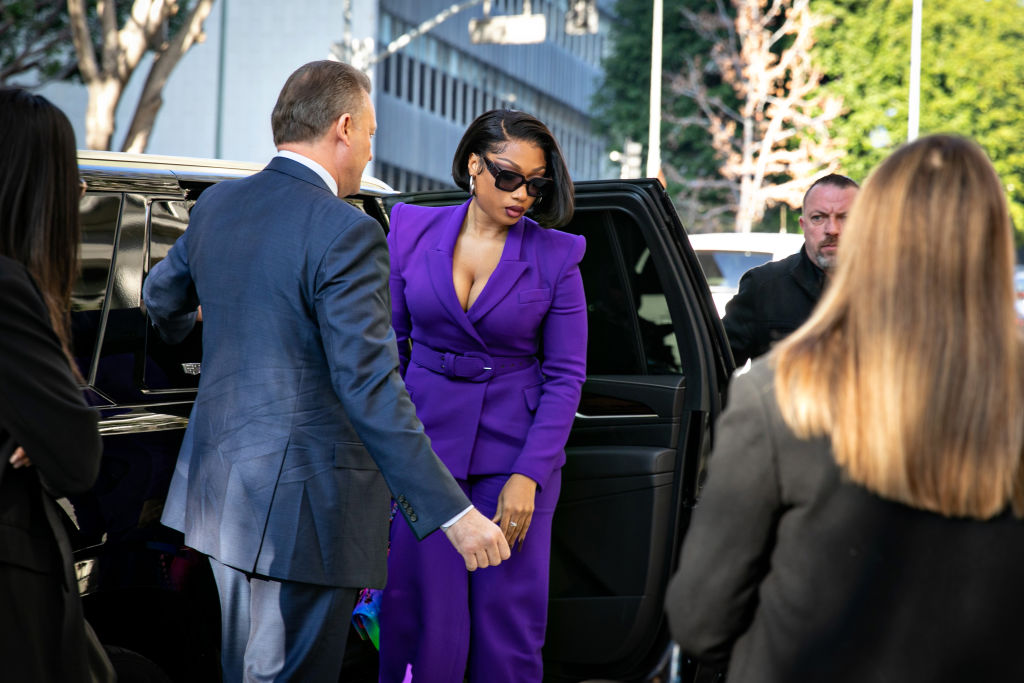
Source: Jason Armond / Getty
Can we truly be real out here?
Misogynoir says, “No.”
Since midnight on Friday, Dec. 9, my Spotify has yet to stray from SZA’s second full-length album, SOS which arrived exactly five and a half years after her cultural reset, Ctrl.
And Friday, Dec. 23, Tory Lanez was found guilty on all three charges brought against him after shooting Grammy-winning, female rapper Megan Thee Stallion in the foot after an alleged argument.
SZA’s new album opens with the Morse code for distress, and over 23 tracks, it takes us on a journey of breathtaking vulnerability. SZA’s capacity to be so honest about unpleasant emotions is one reason why her music resonates with so many, but it also comes with a heap of criticism for being “unhealed.”
Lanez’s conviction brought a sigh of relief to those of us who sincerely wondered if an abuser would actually be held accountable for his violence against a Black woman. Since the 2020 shooting, we have witnessed the vilification of Megan Thee Stallion for deciding to speak her truth, and the abuse reached a distressing crescendo during the trial.
A highly-anticipated album drop and a criminal trial share an unfortunately common thread, highlighting an ongoing problem. Both SZA and Megan Thee Stallion are immensely talented, commercially successful and obviously beautiful. But none of that insulates them from problems most of us face. And because they are Black women, they face particularly harsh criticism when they let their guard down and are less than perfectly composed.
In a time when a lot of hit music tends to avoid emotional complications and messiness, SOS is a tidal wave of honest self-reflection. SZA belts what feels like diary entries after a breakup— revenge fantasies about killing an ex and his new girlfriend, opining that she’d “rather be in hell than alone” on the breakout track “Kill Bill.”
On other songs she extols “moving selfish and calling all (my) favorite hoes” while Travis Scott’s ad-libs echo (“Low”), rebounding with someone new out of loneliness (“F2F”), being blind to all the love inside of her (“Blind”) and “trying to grow without hating the process” (“Gone Girl”).
While SZA’s authenticity is celebrated, there is also a contingent taking their “villain era” very seriously, lambasting her for being weak. The criticism was so loud that SZA took to Twitter Dec. 19, asking why “a b*tch can’t have a FULL spectrum of emotions.”
On Dec. 13, Megan Thee Stallion, birth name Megan Jovon Ruth Pete, took the stand to testify about Tory Lanez shooting her, as well as the incident’s effects on her overall well-being. The press highlighted where Pete said, “I don’t feel like I want to be on this earth. I wish he would have just shot and killed me, if I knew I would have to go through this torture.”
Since the shooting, Pete has faced a relentless torrent of abuse across social media, from slut-shaming to rape and death threats. Flames were fanned by blogs masquerading as legitimate journalism, and once the trial began, there were taunts from some of rap’s boy’s club pillars: Drake, 50 Cent and DJ Akademiks. In what is surely an attempt to avoid the vitriol, Pete hasn’t been active on any of her social media accounts since November. And despite releasing her acclaimed album Traumazine in August, her career is still primed to take a hit.
At the same time we are urging each other to “Be kind, you don’t know what battles people are fighting” after a Black public figure dies by suicide (RIP Stephen ‘tWitch’ Boss), two high-profile Black women are suffering widespread criticism and abuse for being quite frank about their weaknesses and struggles through their art and testimony. The paradox is playing out before our eyes and it is deeply disturbing, yet not surprising.
Because Black women have been characterized as invulnerable to emotional or physical pain since the days of chattel slavery, we aren’t actually allowed to display our hurt.
Because SZA and Megan Thee Stallion are successful entertainers, any show of vulnerability from them is painted as discomfiting and messy, destined to be shamed. They are supposed to cosplay as perfectly healed and one hundred percent confident; they are supposed to be aspirational baddies who don’t acknowledge negativity or weakness unless they’ve already moved on.
When Black women in the public eye are vulnerable and show anything hinting at a full spectrum of feelings, they are shouted down and met with abuse. It sends a message to those of us with less of a platform to keep wearing a mask of happiness and strength and keep our mouths shut because if they are not safe, how can any of us be?
How dare we freely admit to feeling insecure, feeling like a loser, feeling alone, feeling a need to be loved? How dare we bravely call out our abusers and attempt to hold them accountable for their violence against us?
How dare we attempt to live our lives authentically, to let light shine onto the darkest parts of us, to abandon shame? How dare we show our sadness and try to truly heal and reflect instead of pretending we’re over it?
Without the work to make “It’s okay to not be okay” an actionable truth for us rather than a pretty lie, without the work to end violence against us, Black women will continue to encounter backlash for daring to let our capes fall to the ground, and our tears freely flow.
RELATED CONTENT: 8 Times Hip Hop Has Expressed Homophobia And Misogynoir









